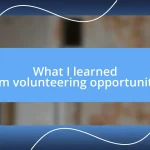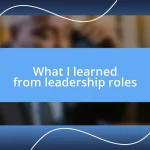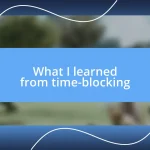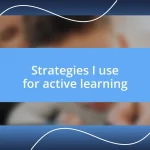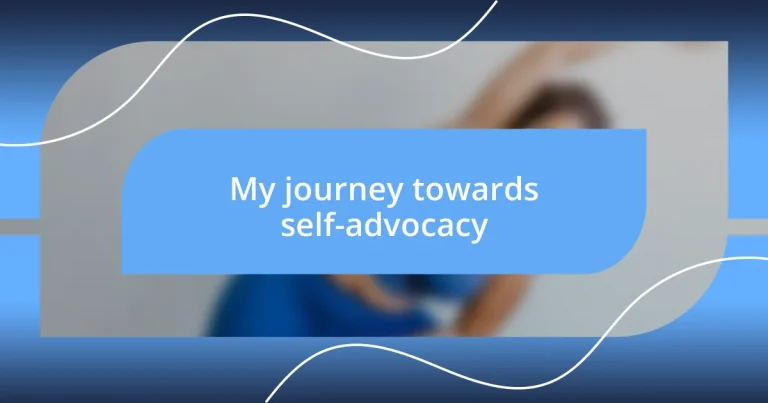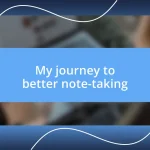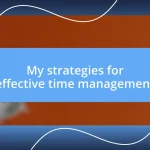Key takeaways:
- Self-advocacy begins with recognizing the power of your own voice and having the courage to express your needs and beliefs.
- Identifying personal strengths and setting clear, achievable goals are crucial steps in developing effective self-advocacy skills.
- Building a diverse support network and celebrating small progress fosters resilience and enhances the self-advocacy journey.
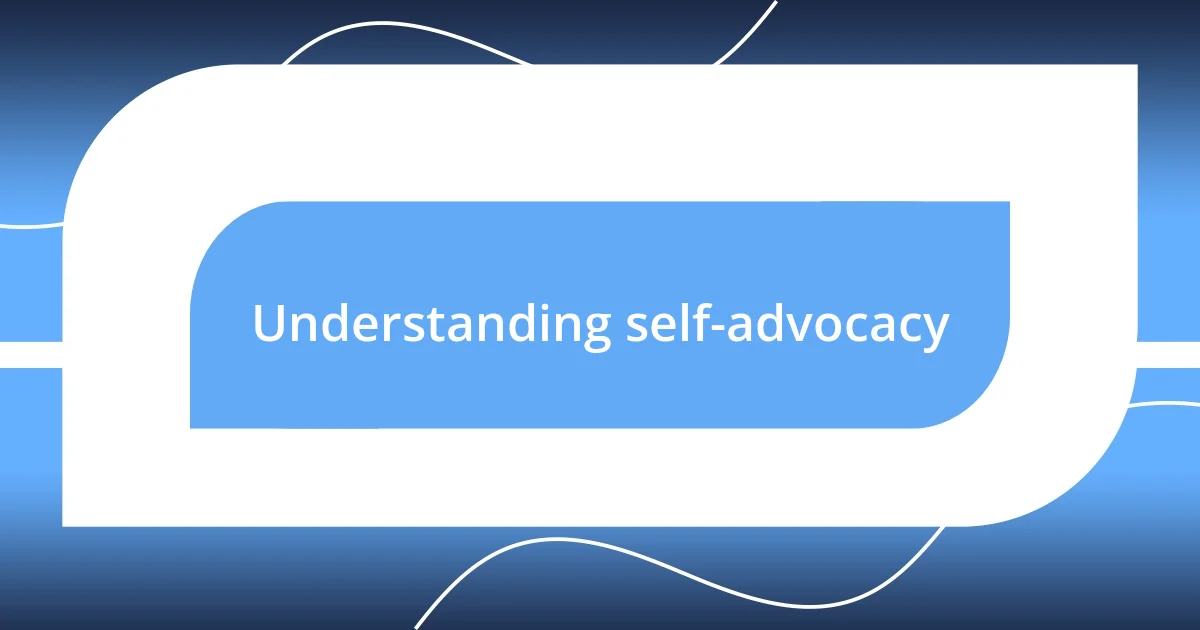
Understanding self-advocacy
Understanding self-advocacy is all about recognizing the power of your own voice. I recall a moment when I was too timid to share my thoughts during a group project in school. It struck me then: if I didn’t speak up, my ideas would remain unheard, and I realized that self-advocacy begins with the courage to express oneself.
It’s not merely about stating your needs; it’s about believing that you deserve to be heard. I remember standing in a doctor’s office, feeling overwhelmed. I took a deep breath and finally asked questions about my treatment—questions I had been holding back. That moment taught me that advocating for myself meant prioritizing my own well-being and understanding that my perspective truly matters.
Self-advocacy can also feel daunting, but think about the last time you stood up for yourself. What emotions came up for you? For me, a mixture of fear and excitement bubbled up inside. It was a powerful reminder that navigating this journey is not just about asserting one’s rights, but also about embracing vulnerability while striving for empowerment.
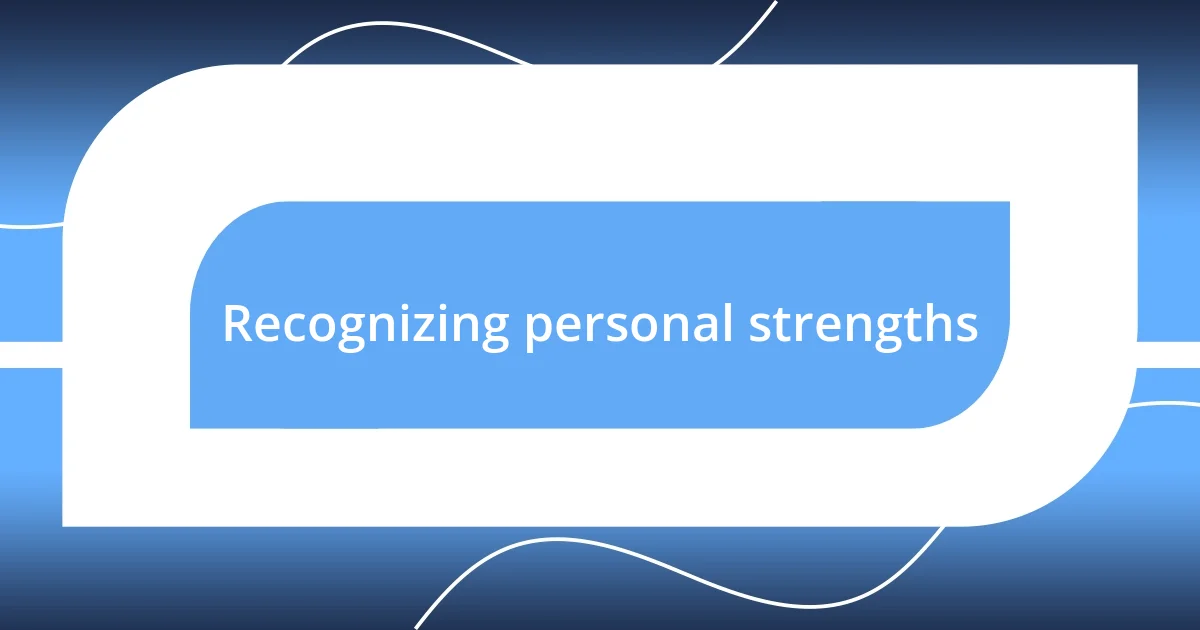
Recognizing personal strengths
Recognizing personal strengths is a pivotal step in the journey of self-advocacy. I think back to a time when I decided to reflect on my skills and attributes. I made a list of things I excelled at, like problem-solving and empathy, and it was eye-opening to see that these strengths were the foundation of my ability to advocate for myself. Suddenly, I felt empowered, as if I had unlocked a treasure chest of potential.
I’ve often found that acknowledging our strengths can feel foreign, especially when we’re conditioned to focus on weaknesses. I remember feeling uncomfortable during a workshop, where we had to share our positive traits. At first, I hesitated, but then I mentioned my ability to connect with others. The relief I felt when others nodded in understanding was profound. It’s crucial to recognize that our strengths are not just personal accolades; they are tools we can wield in advocacy for ourselves and others.
To illustrate this point, consider how different strengths can apply to various scenarios in self-advocacy. Someone with strong communication skills might effectively voice their needs in a meeting, while a person who is resilient can bounce back from setbacks and persist in getting their point across. Understanding these variations among personal strengths allows us to embrace our unique qualities as advocates for ourselves.
| Strength | Application in Self-Advocacy |
|---|---|
| Empathy | Understanding others’ perspectives can help in collaborative discussions. |
| Communication | Clearly expressing needs and concerns effectively conveys your message. |
| Resilience | Persistent in following through, even when faced with challenges. |
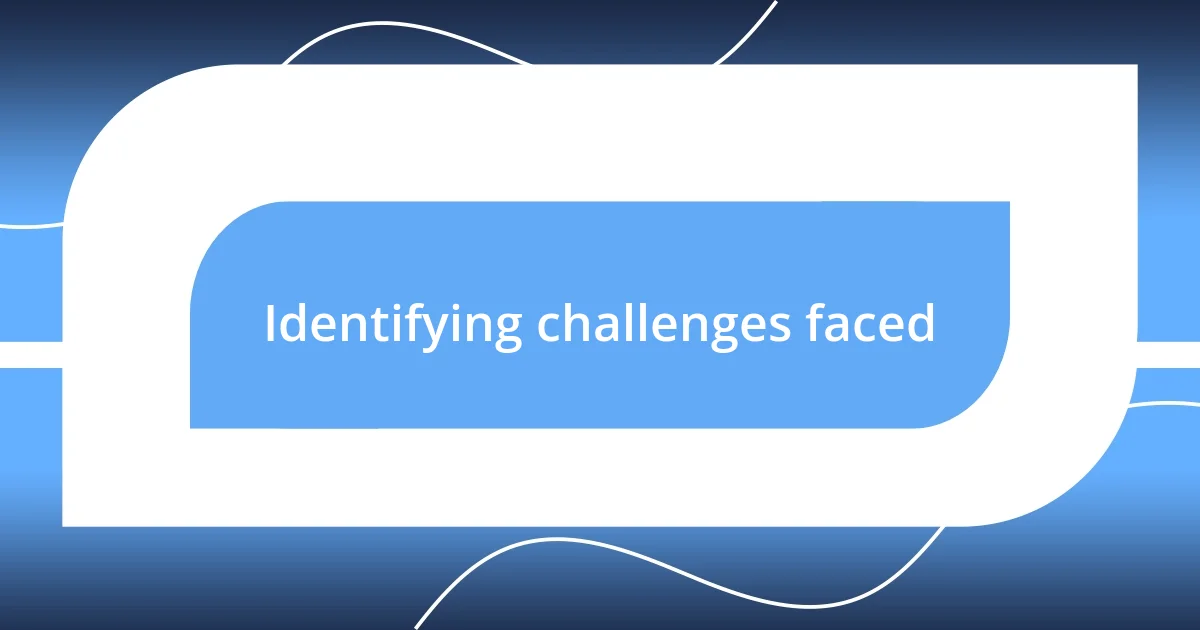
Identifying challenges faced
Identifying the challenges I faced on my path to self-advocacy was an enlightening process. Initially, I struggled with feelings of uncertainty and self-doubt. I vividly remember attending a meeting where I had valuable insights to share but hesitated, worried that my contributions wouldn’t matter. It was in those moments of silence that I recognized fear as a significant barrier, one that kept my voice muted when it mattered most.
Here are some specific challenges I encountered:
- Fear of Rejection: I often worried that my opinions wouldn’t be well-received.
- Lack of Confidence: I sometimes questioned my own qualifications to speak up.
- Overwhelming Emotions: Situations could become so intense that I felt paralyzed by anxiety.
Each of these hurdles taught me the importance of facing my fears head-on. Over time, acknowledging these challenges became a crucial step in building my self-advocacy skills.
As I progressed, I realized that navigating external barriers was just as critical. The experience of advocating in environments where support was scarce could be daunting. I recall a time during a school presentation where I felt outnumbered by peers who disagreed with me. It was tough to push back, but that experience opened my eyes to external pressures and the need for a supportive community around self-advocacy.
Consider these external challenges:
- Unresponsive Audience: Sometimes, people simply do not engage or care to listen.
- Negative Feedback: Receiving critical comments can feel demotivating.
- Cultural Expectations: I often felt constrained by norms that discouraged vocalizing individual preferences.
In overcoming these obstacles, I learned that self-advocacy is not just about personal determination—it’s also about fostering an environment conducive to respectful conversations, even when it feels uncomfortable. Each challenge has molded my understanding and approach, making my journey far more enriching and impactful.
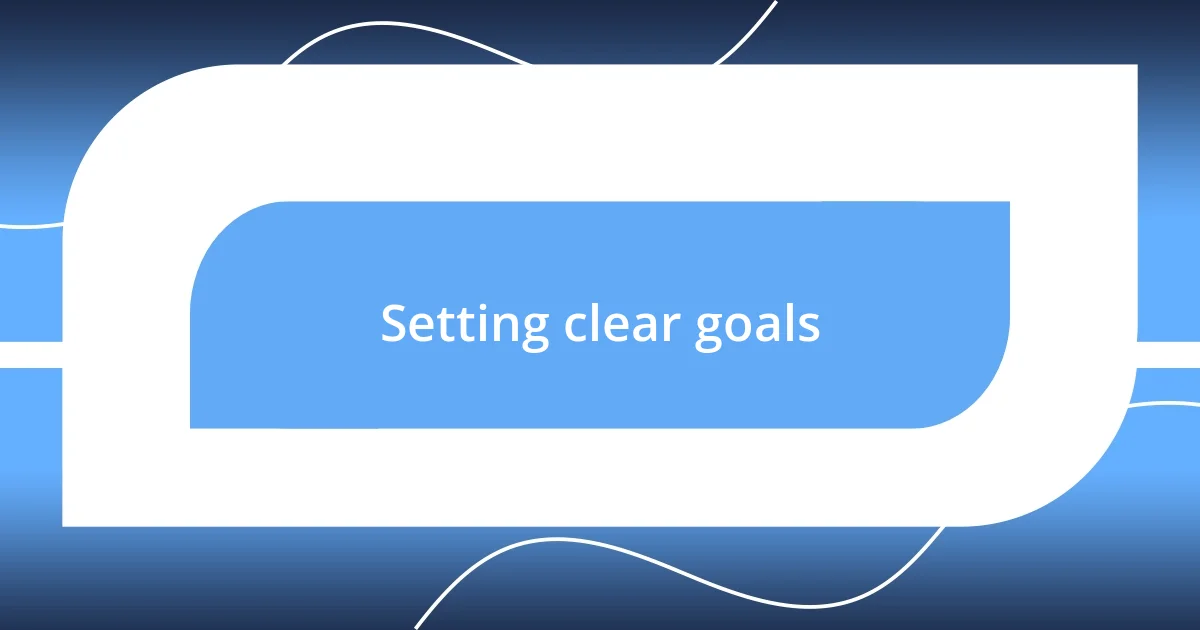
Setting clear goals
Setting clear goals is a crucial part of the self-advocacy journey. I’ve always found that without clear objectives, it’s easy to feel lost or overwhelmed. For instance, I remember a time when I set a goal to speak up during a team meeting. Initially, my plan was vague, simply hoping to contribute. However, once I defined specific points I wanted to address, I felt a surge of confidence, leading to a successful discussion. Isn’t it amazing how having a clear target can shift your mindset?
Another important element in setting goals is ensuring they are achievable. Reflecting on my past experiences, I recall a moment when I aimed to provide feedback to my supervisor. My goal was to express my thoughts clearly, but I soon realized that planning the conversation was key. I took small steps, preparing bullet points to outline my ideas. This preparation helped me articulate my thoughts effectively, making the conversation productive. Have you ever noticed how breaking down large goals into smaller, manageable tasks can make a big difference?
Finally, I believe it’s essential to revisit and adjust goals as needed. There was a period in my journey where I went through some unexpected changes that required me to realign my objectives. I learned that flexibility doesn’t weaken determination; instead, it reinforces it. By allowing myself the space to adapt when things didn’t go according to plan, I became more resilient. How do you handle changes in your goals? It’s a valuable skill that fosters continuous growth in self-advocacy.
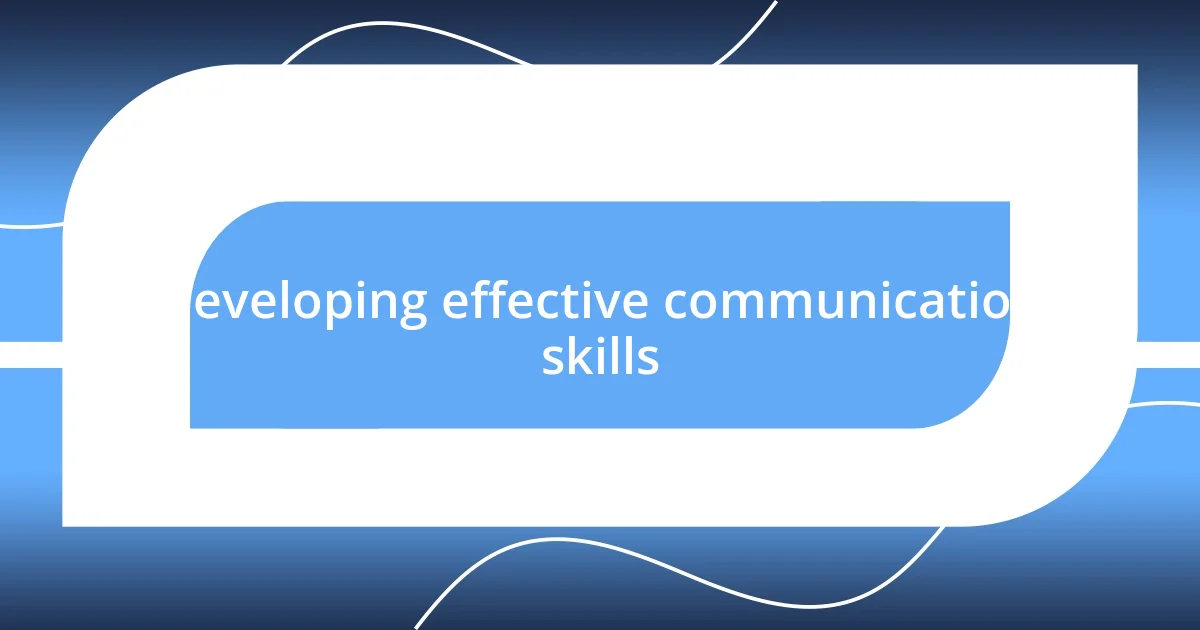
Developing effective communication skills
Developing effective communication skills has been a transformative aspect of my self-advocacy journey. I still remember the first time I practiced active listening, a skill that required me to pause and truly absorb what others were saying instead of planning my response in my head. It felt like a revelation—by being fully present, I not only made others feel valued but also gained a deeper understanding of their perspectives. Have you ever noticed how listening can open doors to more meaningful conversations?
Another pivotal moment for me was learning to express my thoughts clearly and concisely. I often got lost in my own ideas, rambling on in discussions. I vividly recall a frustrating meeting when I realized I completely lost my audience. From that moment, I committed to organizing my thoughts before speaking—bullet points became my best friends. This simple shift made a world of difference in how my contributions were received. Have you tried outlining your ideas in advance? You might be surprised at how much clarity it brings!
Lastly, I discovered the vital role of non-verbal communication in conveying confidence. I used to slouch or avoid eye contact, which only intensified my feelings of self-doubt. I remember one day, standing in front of a group, I took a deep breath, straightened my posture, and allowed my eyes to meet theirs. The shift in my demeanor not only changed how others saw me, but it also empowered me. Isn’t it fascinating how body language can transform a conversation? Through these experiences, I’ve come to understand that effective communication is a multilayered skill, one that requires continuous practice and self-reflection.
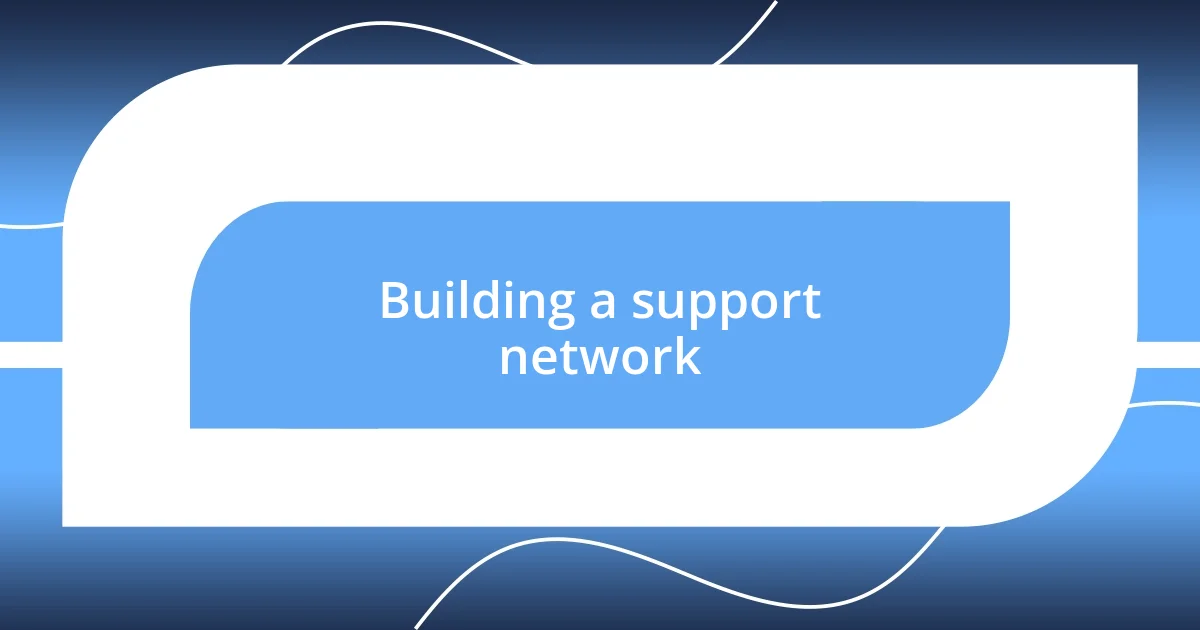
Building a support network
Building a support network has been a game-changer in my self-advocacy journey. I vividly recall the day I reached out to a close friend who had faced similar challenges. Sharing my experiences not only strengthened our bond but also opened doors to new perspectives and strategies I hadn’t considered before. Have you ever felt the relief of just talking to someone who gets it? It’s incredible how a little support can lighten the emotional load.
I learned that diversifying my support network was equally important. Initially, I leaned heavily on just a few friends, but I soon realized I needed a broader circle. I began attending local self-advocacy workshops and community meetings, where I met others who inspired me with their stories. Each new connection added layers to my understanding of advocacy. Have you ever found inspiration in the stories of others? It can be transformative.
Furthermore, I’ve observed that vulnerability plays a significant role in building these relationships. I remember being hesitant to share my fears, worried people might judge me. But when I finally opened up during a support group session, the warmth and encouragement I received were overwhelming. I could see the same courage reflected in others, creating a safe space of mutual empowerment. Isn’t it interesting how being authentic and vulnerable can deepen connections and foster a strong support network? Each conversation reminded me that we’re all on this journey together.
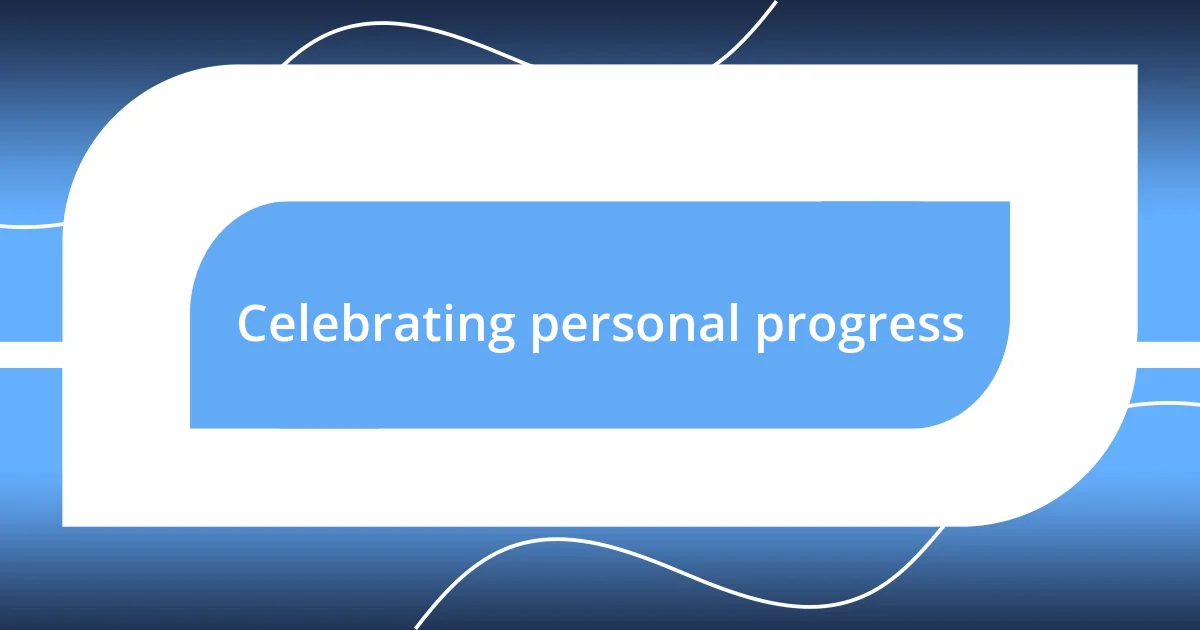
Celebrating personal progress
Celebrating personal progress is all about recognizing those moments when you’ve pushed beyond your comfort zone. I remember standing in my living room, a mirror in front of me and a few notes scattered around, practicing my speech for an upcoming community event. Each time I delivered my lines, I could feel a rush of nervous energy transforming into excitement. Have you ever noticed how rehearsing for a challenge can make a world of difference in your confidence?
As I reflect on the milestones I’ve achieved, even the smallest victories stand out. I once managed to facilitate a group discussion that went off smoothly, with everyone engaged and contributing. This was a significant leap from my earlier days of simply listening in silence. I found myself smiling, thinking about how far I had come. Is there a moment in your life when you realized your growth, even when it felt insignificant at the time?
Looking back, I’ve come to appreciate that celebrating progress isn’t just about the big wins; it’s also about the little steps that often go unnoticed. I recall a day I chose to voice my opinion at a routine meeting. The heart-pounding anticipation faded into delight when my input sparked a new idea. That small act of courage not only validated my voice but also sparked a change in my approach to advocacy. Isn’t it inspiring to think about how even a single moment can alter the course of our journey?



